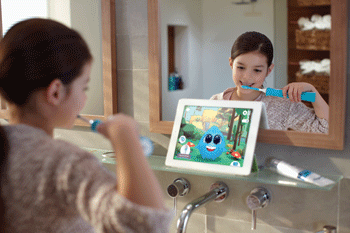Collett Smart Positive Gaming Habits Interview

Collett Smart Positive Gaming Habits Interview
For a long while video gaming has been demonised in the family home, seen as something anti-social that can encourage bad behaviour in kids. But what if gaming was the key to helping Aussie kids form integral and life-long habits?
Leading child psychologist, academic and author, Collett Smart, is calling for parents to start a new discussion about gaming and the positive effects it can have on our kids. This is backed by her own research and global reports which reveals some video games can actually reinforce positive behaviours and habits in their kids' lives – from brushing teeth to going to bed on time.
Interview with Collett Smart
Question: What are the positive affects surrounding kids and gaming?
Collett Smart: Games and apps have a tremendous ability to teach and keep children engaged. They have inbuilt rewards and have what we refer to as a well-balanced -fun-failure' factor. i.e. Just enough failure to keep it challenging and just enough fun to feel rewarded and keep the player returning to the game. When used well and within boundaries, games allow for the development of habits and skills that can be transferred into real time.
Question: Why do you think parents need to re-look at computer games as a positive learning tool?
Collett Smart: All games have the ability to teach. Some games teach both excellent visual spatial skills and positive social skills at the same time. Although, while playing a violent game, children are improving their visual spatial skills for example, but are also learning and practicing aggression. Games are excellent teachers and we can't just separate the emotional behavioural skills from the cognitive skills being learned.
Question: Can you talk us through the research that backs this?
Collett Smart: There is some fascinating research into children's behaviours. Particularly one study which looked at children with asthma (and others with illnesses). Children who played a game that taught them how to better manage their symptoms and treatment coped better with the initial effects of the illness, compared to those that did not have access to the game. Some games even teach children about sharing and helping behaviours. We call these -pro-social behaviours'.
What we want are games that transfer positive behaviours across into real time situations. A recent development is the Philips' Sonicare for Kids Connected Toothbrush which has an app that works via Bluetooth. My youngest child is using it at the moment. There's a little character called -Sparkly' that you look after and mirror the character's teeth brushing habits. The recommended 2 minutes for teeth brushing is so easy for my son because he's following along to the character's brushing instructions, while he watches the germs melt away in the game. It then rewards him with daily scenery changes, food to feed Sparkly, clothing changes etc. This game keeps the child coming back, while instilling a healthy long term habit. That's what we look for – games that install healthy lifestyle habits that transfer off of the screen.
 Question: What types of positive behaviours can be reinforced by games?
Question: What types of positive behaviours can be reinforced by games?
Collett Smart: Prosocial skills include empathy, helpfulness, kindness, reading facial expressions, healthy habits (like teeth brushing, cleanliness, healthy eating) and the obvious cognitive skills like reading and maths improvement.
Question: What type of healthy habits are we referring to?
Collett Smart: As above. Also, there are some fantastic apps for improving mental health and improved mindfulness. These work in the same way as one might use a journal i.e. writing down something you are grateful for each day. Others assist with skills to move through a period of anxiety or depression and can also teach CBT (Cognitive Behaviour Therapy).
Question: What technology should parents look out for?
Collett Smart: We need to look out for games and technology that enhances our children's lives. Aspects to look for include games and apps that:
allow children to create something and encourage imagination
teach language skills
are interactive and require a child to make decisions
encourage healthy off screen habits
encourage healthy socialisation
Question: What are your top tips for parents looking to introduce games into the home?
Collett Smart: It's all about parent-child relationships and lots of communication. Talking about boundaries.
My recommendation is the 3Cs: keep Current, keep Communicating and keep Checking.
Technology in public areas at home
Set time limits
Set content limits
Set age restrictions for apps and games
Know passwords
Watch movies and play games with your children and,
Talk with your children about the content
Teach children to look outward and think of others
Balance online with offline activities
Make use of logging software
Talk, talk, talk
Negotiate a technology contract!
Interview by Brooke Hunter
MORE



